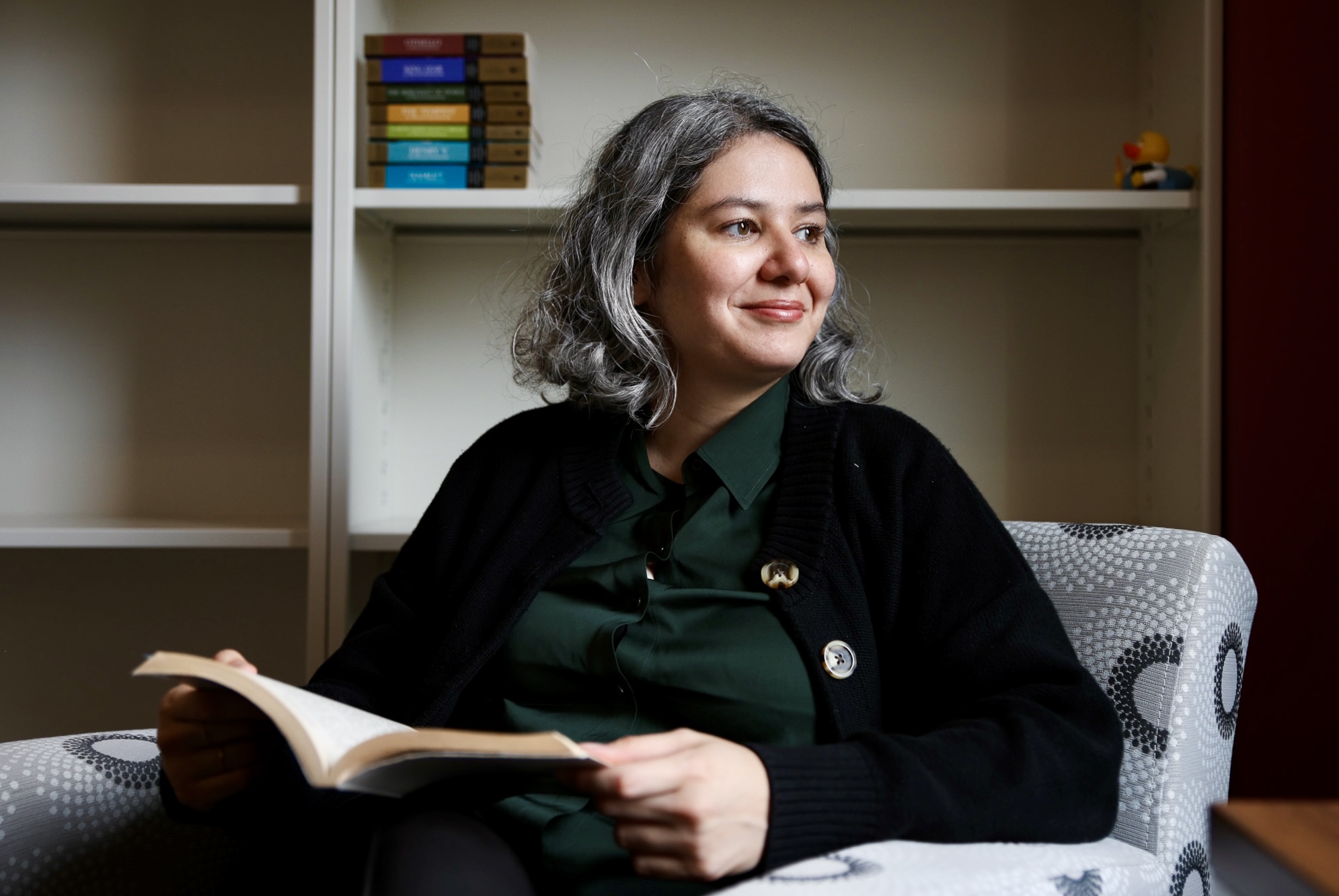As part of October’s lineup for Writers@Grinnell (W@G), assistant professor of English Bruna Dantas Lobato read from the first two chapters of her debut novel, “Blue Light Hours” to an audience of students and staff in the Joe Rosenfield `25 Center.
“I would never be able to finish telling my mother what I saw,” said the protagonist, reflecting on her first weeks at college. “I would need as much time for telling as I would need for living.”
“Do you promise me?” asked the protagonist’s mother in another scene. “Do you promise me you’ll come back in one piece?”
“Blue Light Hours” depicts a young Brazilian woman’s first year away from home, and her mother, to attend a small college in Vermont — a setting not unlike Grinnell’s. Over the blue light of the computer screen, between the sunny skies of Brazil and the wintery expanse of the American northeast, mother and daughter Skype about their new daily lives. Lobato said the story pits the hopes and dreams of a new future in America with the grief enmeshed with leaving loved ones — and a part of oneself — behind.
It is a story inspired by Lobato’s own life.
Lobato, who only just came to Grinnell this past July, has lived in the U.S. for 13 years. She studied literature at Bennington College and obtained Masters in Fine Arts in literary translation and creative writing from the University of Iowa and New York University, respectively. However, growing up in a single-parent household in the coastal city of Natal, northeast Brazil — a region with high illiteracy rates — Lobato never imagined she would ever learn English or attend college, let alone have a career in writing, translation and teaching. In high school, she worked at a five-star hotel, and aimed to become the manager.
Motivated to learn English to better serve tourists, Lobato was accepted to the
Youth Ambassadors Program in Washington, D.C. — an experience that sparked her desire to study abroad. A semester at Phillips Exeter Academy led her to Bennington College on a full scholarship, where she was the only Brazilian student. She learned to read, write and critique in English. However, over time, she realised she had lost the ability to write in her native Brazilian Portuguese.
By the second chapter, the protagonist was settled into college and maintained a good relationship with her mother. But the applause for Lobato as she concluded reading the second chapter felt subdued. The Q&A opened with one student asking, “Any tips for if I’m really sad now?”
Lobato replied, “I was sad writing this book for 10 years, and I survived.”
Lobato has achieved success in her work. Her flash fiction has appeared in The New Yorker and Guernica. In 2023, her translation of Stênio Gardel’s “The Words That Remain” won the National Book Award for Translated Literature. For Lobato, translations were a way to share what she knew about writing and the authors she was inspired by — in an English-speaking world that would try to tell her what “the truth of writing should be.”
Yet, Lobato felt like she was still “pretending that there hadn’t been this whole other life” back in Brazil. Studying abroad had been an “isolating and lonely experience.” On campus, no one spoke her native language. The new social mobility afforded by her American education also put distance between her and her family, who had not received the same opportunities. Hence, “Blue Light Hours” was born.
“A lot of the stuff that happens in the book didn’t happen to me, but the emotions are true,” said Lobato. “The more I studied, the more I changed, and I started to become somebody else.”
“Blue Light Hours” aims to be a “new kind” of immigrant, coming-of-age novel that tackles issues of class and feeling like an outsider on a college campus — experiences absent in typical campus novels. She concocted a “spell” between the mother and daughter characters, where “all they had in the world was each other,” exploring how this dynamic shifted with separation.
Lobato said the novel’s themes extend beyond international students to anyone who feels separated from their original communities but never fully belongs in new ones.
“I’ve been given incredible opportunities … but I’ve also been robbed of something,” she said. “I went back to Brazil, my little town, and I was complaining, ‘There isn’t this, there isn’t that, in New York, we have these other things.’ And then I felt guilty. Why is this no longer enough? Who am I becoming now that I think this is too poor for me, not big enough for me?”
But Lobato emphasised that “Blue Light Hours” was not simply a story of grief and loss. “If this is a young woman who’s just really, really sad, we wouldn’t feel sorry for her, right?” she said. “If we know she wants joy, we know she’s alive and likes Powerade, then we can feel for her much more deeply.”
Lobato added the book also afforded humanity and a “coming of age” for the protagonist’s mother. “We get to see the mother becoming an adult for the first time, without being a young mother,” she said. “She finds her independence, her footing … I feel like the book ends on a joyful note.”
At the start of the W@G event, associate professor of English Hai-Dang Phan introduced the book:
“‘Blue Light Hours’ may be slim, but I wouldn’t call it minimalist, which suggests something simplistic or infinitely small. Rather, I would call it an infinitesimal novel which evokes … everything and nothing, an infinity of intimate details, which are ours, which is life.”
“How very, very lucky we are to have a novel like ‘Blue Light Hours’ in the world, and how incredibly lucky we are to have this writer at Grinnell.”







